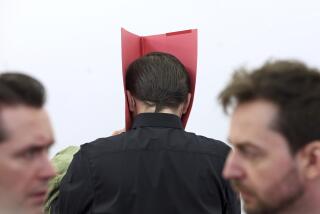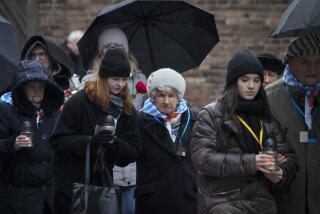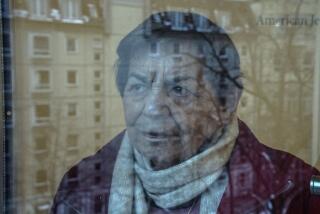Leo Bretholz dies at 93; Holocaust survivor fought for reparations
Leo Bretholz, a Holocaust survivor who became a major voice in the campaign to gain reparations from companies that transported victims to concentration camps during World War II, died in his sleep Saturday at his home in Pikesville, Md. He was 93.
Bretholz played a leading role in a campaign to require SNCF, the French railway system that historians have said conveyed 76,000 people to Nazi camps, to pay reparations to U.S. Holocaust survivors.
He sought to block Keolis, an American subsidiary of the French company, from winning a $6-billion contract from the state of Maryland to operate a planned light-rail system. He had been scheduled to testify on the issue before a Maryland legislative committee this week.
“He was the heart and soul of the effort and one of the most remarkable forces in life that I have ever known,” said Washington attorney Rafi Prober, who had been working on the SNCF case with Bretholz for six years. “Leo was thoughtful, smart, compassionate, funny and tenacious when it came to seeking justice for him and the other survivors.”
The son of Max Bretholz, a tailor and a Yiddish actor, and Dora Fischman Bretholz, a seamstress, Leo Bretholz was born March 6, 1921, and raised in Vienna.
When Nazi Germany annexed Austria in 1938, his mother insisted that he leave Austria. As Nazi thugs went on a rampage against the Jews on Kristallnacht in November 1938, Bretholz, who was 17, swam the Sauer River on a chilly fall night, finally reaching Luxembourg. From there, he traveled to Belgium, and after the Germans overran that country and later the Netherlands and France, he fled to southern France, where he hid in the mountains near the Spanish border.
Finally, Bretholz was arrested and was taken to the Drancy-Le Bourget, France, holding camp.
“In the camp at Drancy, a few days before my selection for deportation, I witnessed the killing of a just-born infant, whom the guard had thrown into the air aiming at it as if it were a clay pigeon,” Bretholz wrote in a 1982 article in the Baltimore Evening Sun.
“The hysterical mother, forcibly restrained by two other guards, witnessing that bestial game, threw herself at the killer (having managed to tear herself away from the guards) and she, too, was killed on the spot,” he wrote.
He and 999 other Jews were loaded into cattle cars on Nov. 6, 1942 — 50 per car with a single hole in the floor for sanitation — aboard Transport 42, which was to take them to Auschwitz and certain death.
In the middle of the night, Bretholz and another young man, Manfred Silberwasser, escaped through a rectangular opening after they finally succeeded in bending two parallel bars. As the train slowed and rounded a curve, the men slipped through the window, and upon hitting the ground, tore off the yellow star with the word “Juif,” French for “Jew,” that had been sewn to their coats.
Of those on the transport, 773 were gassed on arrival or died en route, while 145 men and 82 women were selected for forced labor. Only four men from Transport 42 managed to survive Auschwitz.
Bretholz later joined the resistance group Compagnons de France.
He moved in 1947 to Baltimore, where an uncle and aunt lived. It wasn’t until 1962 that he learned his mother and two sisters had perished at Auschwitz. His father died before World War II.
Through the years Bretholz worked in sales and managed bookstores, retiring in 1997.
He often visited schools to tell students his story so that the history of the Holocaust would not be forgotten. He continued to speak at schools until shortly before he died.
Bretholz chronicled his escape from the transport in his book “Leap Into Darkness: Seven Years on the Run in Wartime Europe,” which he wrote with former Baltimore Sun columnist Michael Olesker in 1998.
Bretholz is survived by a son, two daughters and four grandchildren. His wife of 57 years, the former Flo Cohen, died in 2009.
Rasmussen writes for the Baltimore Sun.
More to Read
Start your day right
Sign up for Essential California for the L.A. Times biggest news, features and recommendations in your inbox six days a week.
You may occasionally receive promotional content from the Los Angeles Times.






